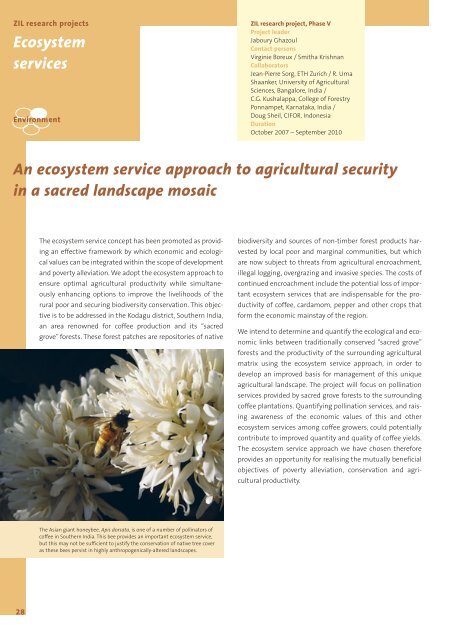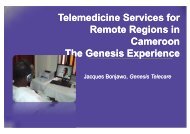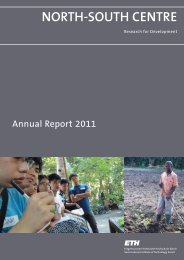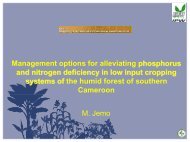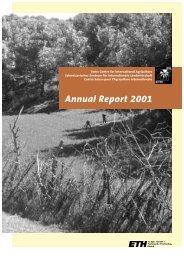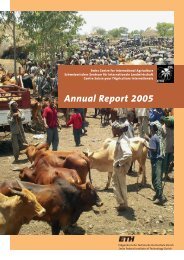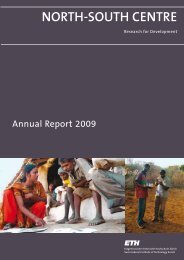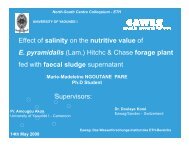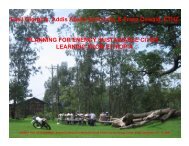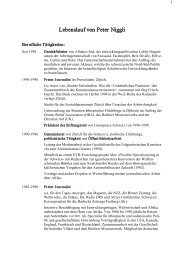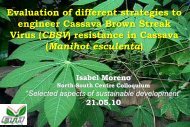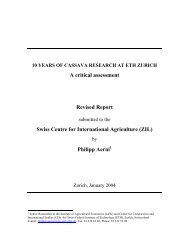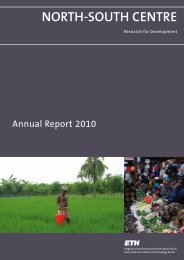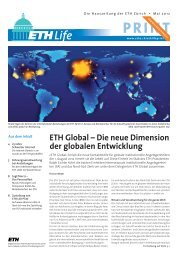Annual Report 2006/07 - ETH - North-South Centre North-South ...
Annual Report 2006/07 - ETH - North-South Centre North-South ...
Annual Report 2006/07 - ETH - North-South Centre North-South ...
You also want an ePaper? Increase the reach of your titles
YUMPU automatically turns print PDFs into web optimized ePapers that Google loves.
ZIL research projectsEcosystemservicesEnvironmentZIL research project, Phase VProject leaderJaboury GhazoulContact personsVirginie Boreux / Smitha KrishnanCollaboratorsJean-Pierre Sorg, <strong>ETH</strong> Zurich / R. UmaShaanker, University of AgriculturalSciences, Bangalore, India /C.G. Kushalappa, College of ForestryPonnampet, Karnataka, India /Doug Sheil, CIFOR, IndonesiaDurationOctober 20<strong>07</strong> – September 2010An ecosystem service approach to agricultural securityin a sacred landscape mosaicThe ecosystem service concept has been promoted as providingan effective framework by which economic and ecologicalvalues can be integrated within the scope of developmentand poverty alleviation. We adopt the ecosystem approach toensure optimal agricultural productivity while simultaneouslyenhancing options to improve the livelihoods of therural poor and securing biodiversity conservation. This objectiveis to be addressed in the Kodagu district, <strong>South</strong>ern India,an area renowned for coffee production and its “sacredgrove” forests. These forest patches are repositories of nativebiodiversity and sources of non-timber forest products harvestedby local poor and marginal communities, but whichare now subject to threats from agricultural encroachment,illegal logging, overgrazing and invasive species. The costs ofcontinued encroachment include the potential loss of importantecosystem services that are indispensable for the productivityof coffee, cardamom, pepper and other crops thatform the economic mainstay of the region.We intend to determine and quantify the ecological and economiclinks between traditionally conserved “sacred grove”forests and the productivity of the surrounding agriculturalmatrix using the ecosystem service approach, in order todevelop an improved basis for management of this uniqueagricultural landscape. The project will focus on pollinationservices provided by sacred grove forests to the surroundingcoffee plantations. Quantifying pollination services, and raisingawareness of the economic values of this and otherecosystem services among coffee growers, could potentiallycontribute to improved quantity and quality of coffee yields.The ecosystem service approach we have chosen thereforeprovides an opportunity for realising the mutually beneficialobjectives of poverty alleviation, conservation and agriculturalproductivity.The Asian giant honeybee, Apis dorsata, is one of a number of pollinators ofcoffee in <strong>South</strong>ern India. This bee provides an important ecosystem service,but this may not be sufficient to justify the conservation of native tree coveras these bees persist in highly anthropogenically-altered landscapes.28


